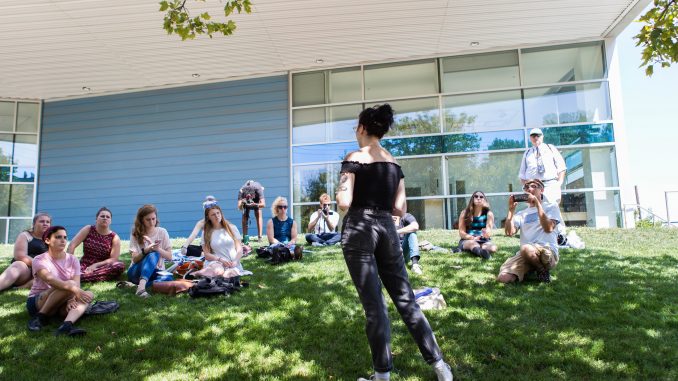
Nora Wilson carries an over-the-counter nasal spray with her wherever she goes — and she hopes she’ll never have to use it.
A few months ago, the junior printmaking major bought two doses of naloxone, known more commonly by its brand name Narcan. The nasal spray is used to reverse the effects of opioid overdose and is sold over the counter at some pharmacies in Philadelphia. Wilson keeps one dose at home and one in her purse at all times.
“I haven’t had to use it, thankfully, but just in case I ever have to, I’m glad I know how,” Wilson said. “I hope I don’t ever have to use it.”
To help combat Philadelphia’s high rates of opioid overdose, Wilson hosted a Narcan training session for students on Thursday outside the Tyler School of Art. Nearly 400 people said they were interested in the event on Facebook, and about 15 turned out to learn to use the overdose antidote.
“I was, more than anything, just happy to know people care about it and want to learn how to do it,” Wilson said. “It’s super easy, so if you want to learn, it only takes a couple minutes.”
“Even if they can’t come today, or can’t come to any of the events I do, if they just Googled it and watched a YouTube video, they know more than what they knew before, and they could help someone more than they could before,” she added. “At the end of the day, that’s a success.”
At the event, Wilson distributed home-made, informational pamphlets about Narcan. She taught her peers where to buy the nasal spray, how to use it and what symptoms people will experience immediately after they ingest Narcan. She shared affordable ways to obtain the nasal spray and common signs of overdose, like blue lips and fingernails and slow breathing.
Wilson learned to use Narcan from an online training course at https://getnaloxonenow.org. She was inspired by personal experience: she can think of 15 people she’s known who have overdosed on opioids and died. At the same time, one of her closest friends just celebrated six years of sobriety after using opioids. It struck Wilson that opioid overdose is so preventable, but still so common, especially in cities like Philadelphia. Last year, there were 907 fatal overdoses in the city — 80 percent of which were caused by opioids.
“It’s a very preventable thing,” Wilson said. “It’s something a lot of people do, and then they get over it and live the rest of their lives. It’s very unfortunate that 17-year-olds die from a stupid mistake they made. You would like to think if you were there, you could do something to help.”
Joseph Purcell, a junior media business and entrepreneurship major, attended the event to prevent what he’s already experienced. An old friend of his, Josh, overdosed on heroin and died last year.
“In college especially, people start experimenting with drugs, and you rationalize it,” Purcell said. “It gets to a point where you don’t even realize where you’re at.”
“I know that this sort of thing is really important, but people really aren’t aware,” Purcell added.
Purcell said Wilson’s training session was informative, and helped him heal a bit since Josh’s death.
Wilson plans to host several more Narcan training sessions over the course of the school year. This time, she couldn’t provide the nasal spray to attendees because she couldn’t afford Narcan on her own. Next time, she hopes she can get Narcan donations from some Philadelphia addiction organizations, like Prevention Point.
For the most part, though, Wilson wants to run the training sessions independently and keep them small. She thinks students will find value in learning directly from another student, as opposed to the university or another large organization.
“I wanted this to be more of a peer-to-peer thing,” Wilson said. “While I really respect all those organizations and appreciate the help they offered, I just wanted to be able to talk to people who were at a similar point as me, just have a conversation more.”
“I was glad people asked questions and came to learn a little more about it,” she added. “That’s the first step, just learning a little bit about it.”



Be the first to comment